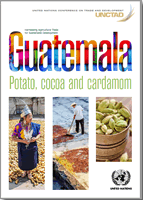
This study is part of a series of UNCTAD publications that focus on policies in three countries, Guatemala, Vanuatu and Malawi, aimed at upgrading and diversifying specific agricultural sectors of rural economies in developing countries with a view to raising living standards among small-scale farmers in a context of female empowerment and food security and above all, sustainable development.
The study analyses three agricultural sectors in Guatemala – potato, cocoa and cardamom - in terms of opportunities derived from trade of primary and processed products. The focus is on the growing trend among consumers in high income countries for artisanal, fair-trade, organically grown, single-origin products that allow niche market penetration by integrating into their traded products a narrative on the history and lives of local farming communities where the primary product is cultivated.
The study bears in mind the heavy costs to implement Voluntary Sustainable Standards, internationally-accepted certification systems, or consumer-driven specific standards set by retailers, looking at domestic sales opportunities, for example within Guatemala’s growing tourism sector, which also allows farmers to hedge against price fluctuations in international markets.
According to the study’s sustainability analysis, the strategies presented are aligned with sustainable development goals, integrating environmental, social welfare, gender equality, a more equitable distribution of income, and, more diversified income opportunities. Outcomes are expected to be positive overall, but the study nevertheless advises care in implementation to minimise any unforeseen and potentially negative long-term impacts, for example on issues such as staple food production.
It further cautions on possible perverse consequences whereby, without successfully integrating small-scale farmers in the product value-chain, the strategies’ principal beneficiaries may rather be intermediaries.
This report concludes with a set of recommended sustainable development policies that take into account food security and the importance of agriculture not only for small-scale farmers but for Guatemala’s economy as a whole.
The study’s five sustainable development policy recommendations are:
Enhance policy coherence and multi-stakeholder dialogue supportive of the development of smallholder farmers. This means aligning trade and agricultural policy, bringing all stakeholders, including small-scale farmers, into the policy and development dialogue, and ensuring that all policies are aligned with Guatemala’s ‘National Development Policy and “Plan K’atun: Our Guatemala 2032”.
Promote farmers’ groups and associations as a means of pooling resources and expertise and enhancing the flow and exchange of information among small-scale farmers. Such groups can also encourage the creation of green and sustainable business, and, by inviting female membership, narrow the gender gap.
Develop and implement competition policy and legislation to reduce anti-competitive behaviour among intermediaries detrimental to small-scale farmers, support market behaviour and a more sustainable use of resources and encourage domestic and foreign investment.
Target the growing international market in high-value, niche/ boutique sustainable agricultural products:
- Taking full advantage of Guatemala’s rich and diverse genetic pool while addressing the capacity to cultivate the primary product in sufficiently large and homogenous quantities using the traditional techniques, culture and know-how associated with the niche/boutique market.
- Devise a national strategy to market niche/boutique products locally through the tourism industry and reinforce national and internationally the ‘Guatemala Made’ brand.
- Introduce and promote a proper agricultural certification scheme that is in line with world-accepted norms for varieties native to the country.
Promote Good Agricultural Practices (GAPs) and encourage feedback from Good Manufacturing Practices (GMPs) on recommendations for production, processing and food transport. GAPs should be based on principles of sustainability, be gender-inclusive and ensure that products are ecologically safe, of consistently higher quality and do no harm, and contribute to food security.
Since the vast majority of Guatemala’s inhabitants live and work in rural areas, rural development is the main driver of poverty reduction and will be essential to achieving Sustainable Development Goals. It is anticipated that raising rural to the level of urban incomes will help reverse the current pattern of rural-urban migration that is fueling unsustainable urbanisation.
This UNCTAD study has drawn upon some of the best available expert information on the challenges Guatemala faces on its road to development.



